Rotorua to Auckland
– rotten eggs, the Haka and hairy feet
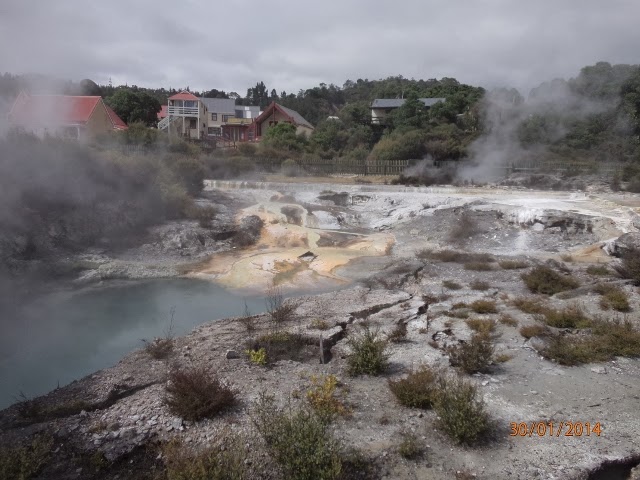.jpg) |
Whakawerawera - not the most attractive back garden, and
smelly too |
The journey to Rotorua (
Second Lake)
took longer than expected, inevitably. As I've said before NZ is picturesque
but its roads can be deceptive. Most of the main highways are excellent but
usually with only a single carriageway in each direction. Venture off these and
you’ll twist and turn like a downhill skier. Estimated journey times are,
therefore, best taken with a pinch of salt. We arrived in Rotorua late in the
afternoon and, despite my earlier misgivings, my mood had lifted considerably.
 |
Our guide; fierce but prone to bursting
into song |
Rotovegas sits on a site of major geo-thermal activity with
geysers, steam vents everywhere and an abundance of naturally occurring hot
pools; all adjacent to a huge lake, now heavily polluted sadly, that filled
when the Rotorua caldera was formed. These sites have been pulling in tourists
for around 130 years and today many hotels, motels and B&Bs jostle for the
best positions by the thermal pools and the lake.
 |
| Just letting off steam |
The local Te Arewa Maori have sensibly secured their
ancestral homelands against encroachment or takeover and offer some of the best
tours to these sites. We chose to visit the Whakawerawera Thermal
Living Village,
which just happened to have the best view of the geysers. It also sat on a major
thermal hotspot with many bubbling mud pools, boiling mineral springs and
silica terraces. On first sight it seemed like an inhospitable and menacing
place to live; clouds of steam hung everywhere and seeped from holes and cracks
that seemed dangerously close to homes.
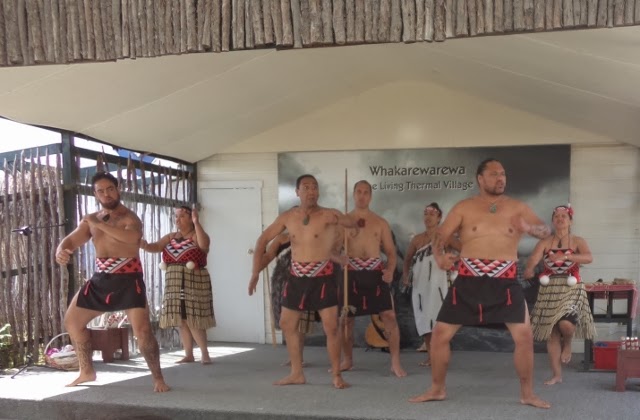 |
| A cultural group performs a haka, part challenge part greeting |
At one point our guide persuaded the
largest guy in our group to jump in the air. When he landed the ground vibrated
under our feet. She then took great delight in pointing out that the crust
where we were standing was probably no more than about 6 inches thick and that
boiling mud or water lay in the hollow void underneath. Overlay this with all
pervading whiff of rotten eggs and you'd be forgiven for thinking that you'd
wandered into Dante's inferno.
 |
| No comment necessary |
As we followed our guide around the village we soon learned
that the Maori don't think this way all. It's true that many of the pools are
dangerously hot, with surface temps of around 100c. It's also true that the
area is prone to eruptions. However, there are many positives. The village has
an inexhaustible supply of heat and hot water that's available 24/7. The Maori
use it for bathing, for cooking and to earn livelihoods through tourism. The
thermal hotspot also has spiritual significance for them.
 |
Apologies, I couldn't keep her off the stage.
Once a drama queen........ |
After the tour we luckily coincided with a cultural
performance, the highlight of which was a feisty Haka full of eye rolling,
tongue flapping, thigh slapping and shouted Maori challenges - a bit like a PMQ
session in the UK
parliament really. It was very exciting and amusing, especially when the group leader
got the audience on its feet to join in. The village also offered a 'hangi'.
This is a traditional feast cooked in the hot pools and in underground ovens.
This seemed OTT for lunch so we opted instead for corn on the cob, cooked in
the pools of course, and covered in butter.
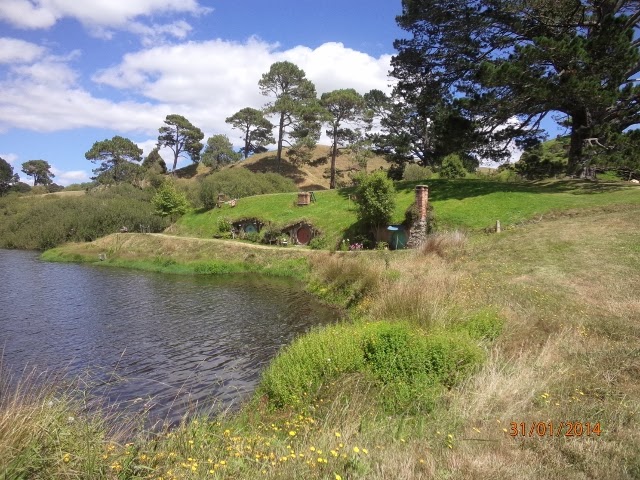 |
| Hobbiton - a first glimpse |
After lunch we ambled about the village, bought a couple of
Maori carvings and then spent half an hour in the company of Jason, the
village's resident tattoo designer and masseur. He gave the term 'laid back' a
whole new perspective. Many hours later he provided a design for Fo's next
tattoo. I won't spoil the surprise but frogs and dragons figure prominently.
 |
| She just never stops property hunting |
In the afternoon we visited the
Rotorua
Museum, strangely housed in a
mock-Tudor building in the
Government
Gardens. The main
attraction here was a short film about the
Mount Tarawera
eruption in 1886 which killed over 150 people around Rotorua. As the eruption
unfolded on the screen our seats bucked and shook in sync with the film. It was
cleverly done and, judging by the occasional shriek from behind us, managed to
rattle a few of our fellow viewers.
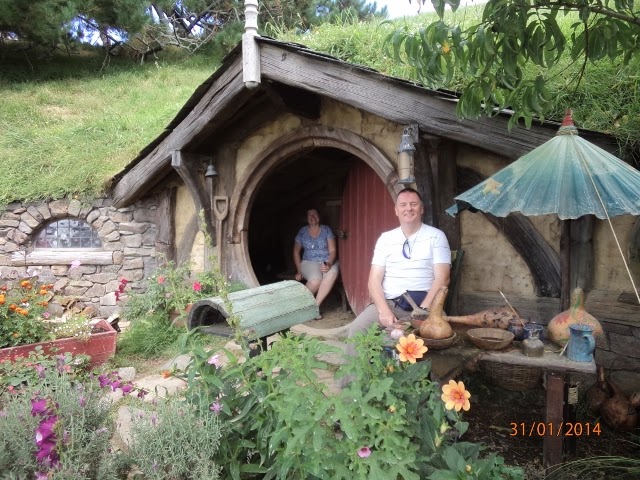 |
| I know, I swore I wouldn't do this. |
Its other main attraction, and one that I found better by
far, was a very moving short film about the 3000 or so Maoris who served
alongside the British Forces during WW2 (in their own battalion of course).
They developed a fearsome reputation apparently and frequently found themselves
used as shock troops in the thick of the action in North Africa and
Italy.
Considering the brutal land wars between the Maori and the Europeans (Pakeha)
during the late 19th century I am amazed that any were involved in this
conflict, especially as they were not subjected to conscription like other New
Zealanders.
 |
| Once in, she was almost impossible to winkle out |
Many of the young Maori men who went seemed to have quite simple
reasons for doing so; to get a new pair of boots, to avoid the boredom of
everyday rural life, to see some more of the world or, like Bilbo Baggins, go
on a big adventure. In fact Maori leaders probably encouraged them to
volunteer, believing that the Treaty of Waitangi, which conferred the rights of
a British citizen on Maoris, also came with certain obligations to King and
Country. As one Maori leader commented "We are of one house, and if our
Pakeha brothers fall, we fall with them. How can we ever hold up our heads, when
the struggle is over, to the question, ‘Where were you when
New Zealand was at war?’ " OK,
history lesson over.
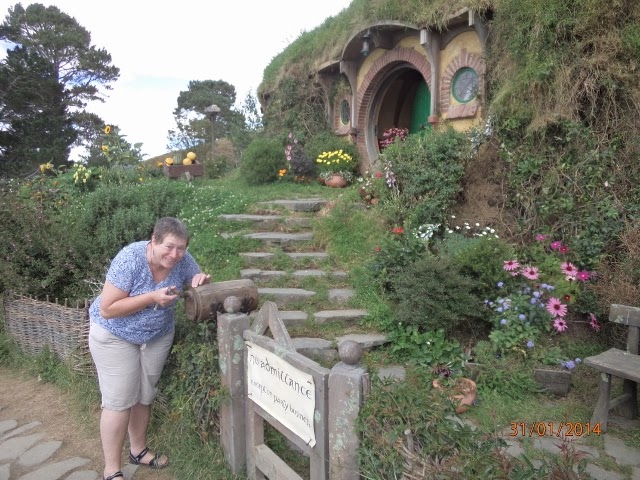 |
| Outside Bag End no less. |
By late afternoon it was all we could to drag ourselves back
to the motel for a hot soak in its natural thermal spa. We dined in on lamb chops
and roasted kumara (sweet potato) before hitting the sack early for our trip to
Hobbiton the following day. After a surprisingly relaxing early start, we arrived at
Shires Rest, an LOTR themed cafe and ticket office on the outskirts of
Matamata, in good time for our 10.00 tour of the film set of Hobbiton. The
original site had been almost completely deconstructed following the filming of
LOTR.
 |
Off to the pub, which the Hobbits sited on the edge of
town, sensibly. |
I found this a bit strange because Peter Jackson must have known he would
go onto film The Hobbit eventually! Anyway, when it became time to rebuild
Hobbiton for the second trilogy the owners of the land cannily asked the
film-maker to make the construction permanent. Thus they inherited a little
goldmine to which coach-loads of devoted tourists flock, us included, seemingly every 10
minutes.
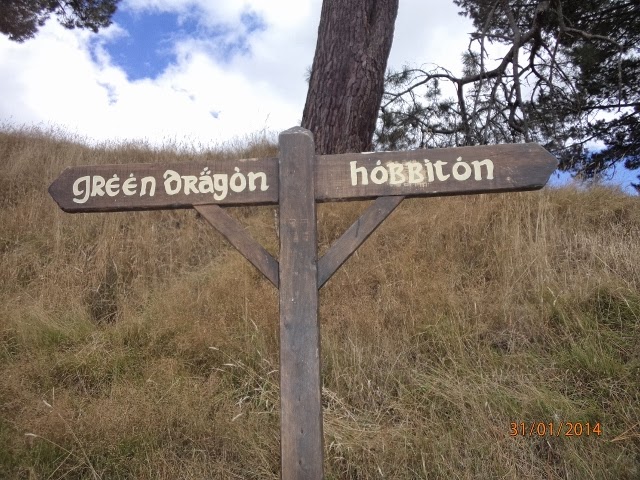 |
| Helpful. |
In fairness our tour, led by the enthusiastic Christy, was
very well done and it was delightful to watch the inane grin on Fo's face get
wider with each Hobbit hole we passed. Of Hobbit holes Tolkien wrote "In a
hole in the ground there lived a Hobbit. Not a nasty, dirty, wet hole, filled
with the ends of worms and an oozy smell..." I hate to gainsay the
venerable author but that's precisely what lay behind each door we opened in
Hobbiton. If you haven't read the book or seen the film then Bag End will mean
nothing to you. But I found it great fun, even if it was only a film set.
I could have included so many more pictures of our tour of Hobbiton but there only so much twee a man can stand. Anyway, from Hobbiton, we drove back to
Hamilton
to reconnect with the Northern Explorer train service and onto
Auckland, our final destination in NZ.
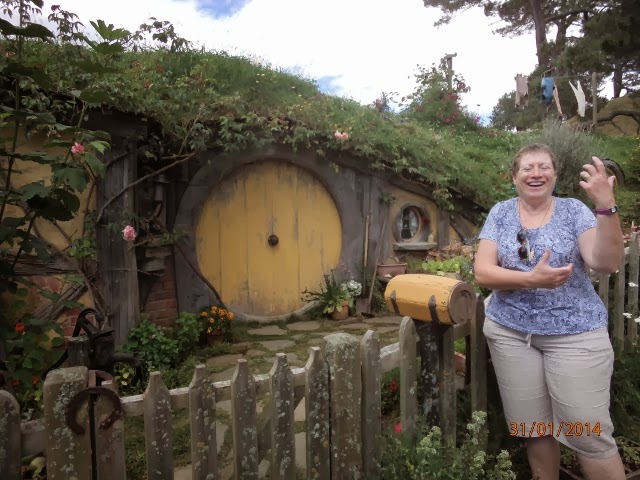 |
| It used to be this size but then he became a Hobbit. |
.jpg)














No comments:
Post a Comment